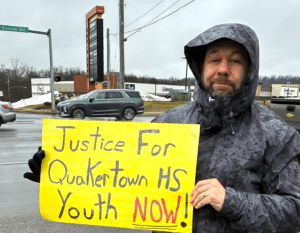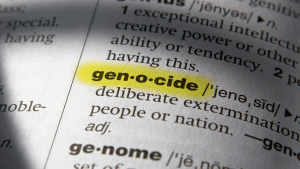Tim Alberta’s The Kingdom, The Power, and the Glory: American Evangelicals in an Age of Extremism is a deep dissection of one of America’s most negatively viewed faith groups. For Alberta, the task is a personal one. Still a Christian himself, he grew up the son of an evangelical pastor at the Cornerstone church of Brighton, Michigan. When his father passed away in the summer of 2019, Alberta returned to Cornerstone for the funeral, which is where his book begins. At his father’s funeral, the renowned journalist is criticized by guests for his views on President Donald Trump and the conservative radio host Rush Limbaugh, rather than allowing the son of their beloved spiritual leader to mourn. The last straw occurs when Alberta is handed a note from a longstanding Cornerstone elder, who states he is complicit in the evil plot of the deep state to overthrow God’s plan. When he hands this note to his wife, she cries: “What the hell is wrong with these people?”
This question steers Alberta throughout his 445-page exploration into the Evangelical faith community he belongs to. Divided into three main sections – “The Kingdom,” “The Power,” and “The Glory” – Alberta writes about his travels over America, visiting Evangelical churches, university campuses, conferences, and diners for interviews with those involved at the ground level. In doing so, Alberta goes about to prove what we summarize as his overall thesis: that many of the culturally conservative members of the American Evangelical church have been overtaken by the fear of losing cultural clout and power and that religious leaders, institutions, as well as politicians and pundits, have been all too willing to feed into these fears for their own sakes.

The Kingdom
Chapters one through seven comprise the section “The Kingdom,” which primarily focuses on the plight of pastors dealing with “Make American Great Again” (MAGA) congregants. One poignant moment occurs in Chapter One when Alberta visits Chris Winans, the man who took his father’s place as lead pastor at Cornerstone. During the COVID-19 lockdowns, Winans experienced massive blowback from Congregants for keeping Cornerstone closed. Likewise, Winans received criticism for refusing to speak out against vaccine mandates and the George Floyd protests. Congregants had even begun to leave Cornerstone. These events highlight one of Alberta’s central themes: American Evangelicals have become increasingly confrontational and unwilling to be stewarded by church leaders they perceive as unwilling to stand up for Christian nationalist principles. In this, Winans recognizes that he could not adequately address his Congregants’ frustrations for a long time. Contemplating the January 6 riot and the clear presence of Christianity within it, Winans states: “It all could have been prevented … if pastors like him had been more forceful in pushing back on the craziness that had penetrated the Church.” What had penetrated the Church was the worship of America, and while Winans would not feed into this new dimension of American Evangelical worship – nor truly push back against it – others, such as pastor Bill Bolin of Brighton, Michigan’s Floodgate church, were happy to. It was precisely Bolin’s church community where some of these “Cornerstone expats” found their new spiritual home.
“The Kingdom” explores similar church communities and institutions all too happy to feed into mixing conservative theology, politics, and national identity, such as Rev. Robert Jeffress’ First Baptist church out of Dallas, Texas, and the famed Liberty University founded by Jerry Falwell Sr. Even those who expressed particular concerns of having gone too far, such as Jeffress, were still incapable of completely condemning the marriage between American Evangelical faith and national identity after Trump’s presidency. As Alberta puts it, these people are like “hungover frat brothers the morning after a kegger – not necessarily apologizing for their behavior the night before, but acknowledging somewhat sheepishly that things had gotten out of hand.” This is a theme that Alberta touches on throughout his book; Greg Locke of Global Vision Bible Church is another example from the following section. Locke, like Jeffress, expresses some worry to Alberta about his congregants’ understanding of Scripture and how their faith in Jesus should direct their political opinions and actions. However, time and time again, these figures seem more interested in the heightened status that comes with feeding into their congregants’ cultural anxieties as their congregations and visibility in the Evangelical media sphere grow.
The Power
While Alberta is willing to lend some credit to the pastors-gone-awry of communities such as Locke’s, he seems less forgiving to the political and cultural operatives who profit from these communities. These include personalities such as the former Trump administration national security advisor Michael Flynn and the political lobbyist Ralph Reed. Both are key figures in right-wing political events and gatherings highlighting Alberta’s sense of a cultural and atmospheric shift within American Evangelicalism: Flynn with the ReAwaken America Tour and Reed with the Road to the Majority conference.
READ: Pennsylvania’s Prayer Warrior: Abby Abildness and Her Dominionist Crusade in the Commonwealth
Throughout the book’s second section, “The Power,” Alberta notes multiple instances where it seems right-wing fueled American evangelicalism has morphed into something un-Christian. One example is Alberta’s mention of the “Fuck Joe Biden” and “Jesus is a Badass” shirts conference and convention goers wear at these supposed Christian-catering events. He likewise critiques the rhetoric of politicians such as Florida Governor Ron DeSantis, whom Alberta notes has twisted Scripture, replacing keywords such as “the devil” with the “left” in order to villainize his adversaries. Similarly, Alberta notes Hershel Walker’s likening Democrats to “Satan incarnate” in a campaign speech. Thus, more than simply profiting off of cultural anxiety, there is an unabashed willingness to distort the image of Christ, Christian values, and even the Bible in order to prop up a larger culture of contemporary, MAGA-inspired Republicanism. In the end, as Alberta alludes to, this new American Evangelical culture is after power. It is willing to make several concessions to its faith to get it.
The Glory
While Alberta’s book paints a rather glib portrait of modern American Evangelicalism, he likewise provides insights into what he believes Christian evangelicals can do to fight back against the MAGA, Christian nationalist crowd. Primarily, this is what the final section, “The Glory,” centers upon; however, we would be remiss not to note the glimmers of a way forward throughout his book. One such instance in “The Kingdom” comes from Alberta’s meeting with John Dickinson, an Australian professor of theology who moved to the U.S. to address the politicized nature of evangelicalism in America. When asked what American Christians can do to improve, Dickinson asserts that Christians need to study “the scriptures with PhD-type rigor and a kindergarten-level vulnerability” to shake the sense of entitlement and fear their faith community is experiencing. Another similar way forward is in conversation with the theologians Cyril Hovorun and Miroslav Volf. Both stress that American political evangelicalism, with its penchant for portraying opponents, even other Christians, as evildoers fighting for Satan against God-ordained warriors like Donald Trump, can be countered with proper theology. Thus, there is a call for Christians to be humble and studious and for them to step up against Christian nationalism in the name of their faith.
READ: Christian Leaders ‘Horrified’ About the Ongoing ReAwaken America Tour
Again, throughout “The Glory,” we see ways forward, ways of countering MAGA Christianity, and moments of victory for non-Christian nationalist Evangelicals. The Word of Life pastor Brian Zahnd and recent developments in the Southern Baptist Convention (SBC) are prime examples. Zahnd, for example, sets a precedent for refusing to politicize the Gospel. He had begun to push away many of his congregants in 2004 after deciding he would refrain from making public political statements. Alberta states that this actually served Zahnd well during the Trump presidency and COVID-19, as Zahnd felt “insulated” from divisive politics and saw his community grow while others saw their diminish. Concerning the SBC, chapters nineteen and twenty of “The Glory” are dedicated to the SBC’s passing of a proposal to create a database that would keep records on accusations of sexual harassment and assault in the church. Russel Moore – the famous head of the SBC who had been exiled from the convention in 2021, which essentially began when he criticized Donald Trump in the lead-up to the 2016 election- spearheaded this proposal. However, while Moore worked from the outside of the SBC to change the culture, credence is also lent to the work of non-church-leaders such as Rachael Denhollander, a SBC outsider who made it her mission to take a stand with survivors of sexual abuse in the church community. This drives home another of Alberta’s main points: actual change within the church may need to happen from the outside, especially when leaders are unwilling or incapable of taking the kind of stands that Zahnd had previously taken at Word of Life.
Conclusion
Overall, The Kingdom, The Power, and the Glory: American Evangelicals in an Age of Extremism is compelling for those interested in the contemporary intermingling of right-wing American politics and Evangelical Christianity. Alberta’s writing style is engaging, and the varied cast of characters and settings provides the reader with an expansive view of the issue. This book is recommended especially for those new to the topic, as Alberta provides historical looks into American evangelical politics, which may not offer much new information for academics or even the well-read layperson but is essential for new initiates. Even so, Alberta’s book is a quick read and recommended to academics and knowledgeable readers as well, who will undoubtedly find some new insights on the issue of contemporary American evangelical communities and politics through the various accounts Alberta provides. Lastly, we may note that Alberta’s focus on what can practically be done is especially appreciated. Thus, while Alberta’s book, at the surface level, asks a question many others have asked and attempted to answer before, it offers a refreshing perspective – that of the Christian attempting to understand how to fix their community – and makes genuine attempts to provide a practical way forward for both lay Christians and Christian leaders.
That said, we may make one critique, which pertains to Alberta’s tone and language when discussing some of the evangelicals under scrutiny in his book. Alberta states that Christians are called to live up to a higher standard that God sets. This serves as the ethical foundation for his critique of right-wing evangelical discourse, especially its demonization of others. However, Alberta has no qualms about framing his opposition negatively either. For example, when speaking of the U.S. Congresswoman Lauren Boebert, Alberta writes:
“A small-town restaurant owner who’d been arrested four times in the decade before political office, Boebert was fond of boasting that God told her to run for Congress because her unlikely victory ‘would be a sign and a wonder to the unbeliever.’ If the unbeliever paid attention to Boebert, the only signs they saw were psychosis.”
The language used can be understandable to a certain degree; the negative effect people such as Boebert have on the public can be considered quite large. Likewise, Boerbert and fellow right-wing Evangelicals like her have had no problem villainizing their perceived enemies for the sake of ginning up the base. As Alberta mentions, Boebert has made jokes about Muslim colleagues being suicide bombers, prayed openly for Biden’s death after winning the 2020 election, and has all but explicitly stated she is for theocracy. Thus, some will see Alberta’s biased digs at others as justified. However, Alberta’s book calls for a change of heart among American Evangelicals if there is to be actual change. Perhaps this change could also take shape in being more attentive to how we frame those we are criticizing.







